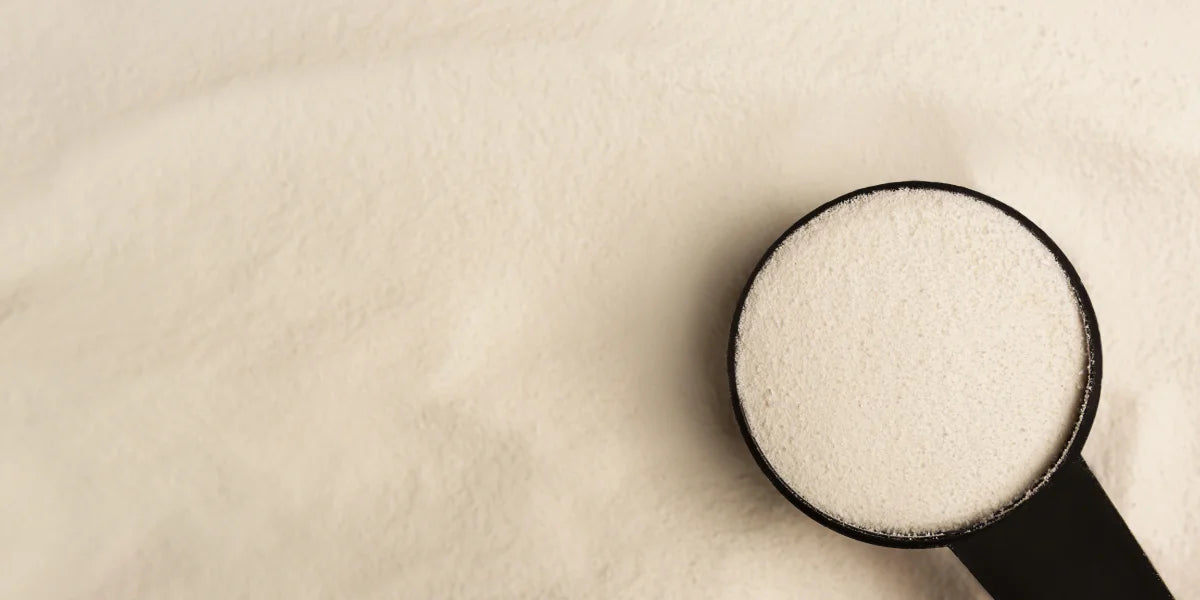It’s a hugely popular supplement, but collagen use is somewhat controversial within the medical community. While there have been several small-scale studies that have helped describe collagen’s potential benefits for hair and skin health, it’s not regulated by the FDA and there are no standardized requirements for sourcing, purity, dosing or safety. But this doesn’t mean that collagen supplementation doesn’t work—instead, it’s a great example of how a health issue like hair loss may require more than a single medication, supplement or intervention to improve. We’ve also asked Dr. Christina Han, a board-certified dermatologist and Medical Director at XYON, to weigh in on the benefits of collagen for hair.
Does collagen really make hair thicker?
Collagen often appears as an ingredient in hair care products and health supplements, but does it actually help improve the thickness of hair? Let’s look at what we know about collagen supplementation.
The first thing to understand is that collagen is a type of protein. The form of collagen commonly found in products you can buy over the counter is hydrolyzed collagen, or collagen that has been broken up into smaller segments with the help of chemical reactions. These smaller fragments are called peptides and their small size makes them easier to absorb into the body and potentially exert effects on cells.
The second thing to be aware of is how the dynamics of the hair growth cycle are controlled by a variety of signaling proteins. These small protein fragments determine when the hair follicle regenerates and how the hair contained within it develops. The effects of collagen supplementation have been extensively studied in animal models.
One study found that collagen significantly increased the expression of hair growth promoting factors like VEGF and IGF-1, when compared to treatment with finasteride alone. Growth factors like VEGF and IGF-1 have been closely associated with transitioning the hair follicle into the active growth phase, maintaining the active growth phase and promoting the formation of thicker hair.
It’s also been speculated that collagen supplementation can help provide adequate protein levels to support the formation of keratin, a protein that is important to hair formation (Hwang et al, 2022). Collagen may also help improve the blood supply to hair follicles (Oesser, 2020). All these properties could contribute to thicker, healthier hair growth, but it’s not entirely clear how much collagen someone would need to take to achieve this.
A systematic review of 19 studies and 1125 participants between the ages of 20 and 70 found that collagen supplementation for just 90 days was enough to cause improvements in hydration, skin elasticity and the appearance of wrinkles when compared to a placebo (Miranda et al., 2021). A recent study focusing on the potential applications of collagen supplementation in the treatment of various hair loss disorders found that the addition of a collagen tablet led to statistically significant improvements in global assessment scores of hair loss at the 6 week and 12 week timepoints (Milani et al, 2023). While these results are encouraging, more research is needed to definitively establish the benefits of collagen.
We interviewed Dr. Christina Han (MD, FRCPC) to get her professional insight on the usefulness of collagen supplementation as a treatment for hair loss and to support healthy hair growth.
In your opinion, is biotin or collagen a better supplement?
“There is a paucity of medical evidence when it comes to the supplementation of both agents when given orally. Much of the glamour of supplementation with these agents is related to some of the basic science we know about hair and its structure, namely that hair is composed of a protein called keratin.
Biotin does assist with keratin production, which is why biotin tends to be marketed to build stronger hair and nails, but caution needs to be exercised when it comes to claims that it can help regrow hair – this is not well validated in the medical literature. Unless a person has a true biotin deficiency, it’s unlikely that biotin supplementation alone will result in significant hair growth.
Collagen on the other hand, only makes up a small portion of hair and there is limited data on its benefits for skin and hair. We know that intrinsically, we lose collagen over time due to aging and this is seen in hair as well. However, oral supplementation of collagen is not likely to dramatically cause hair growth.
Collagen may, however, provide some indirect benefits such as antioxidant properties, reduction in inflammation and offering scalp support to the existing follicles.”
How much collagen does the average person need?
Dr. Han explains that the absence of standardized guidelines for collagen dosing makes study data difficult to generalize.
“Because there are few studies looking at collagen in the context of hair loss, there are no guidelines on recommended dosages. Also, various formulations exist, including collagen peptides, collagen proteins, powder, capsules, etc. Collagen is generally well tolerated, but I recommend if patients are going to add this into their regimen, to follow the label instructions for dosing and to inform their healthcare providers that they are taking collagen to ensure that there are no issues with any other medications they may be taking, or health conditions that would exclude them from taking collagen.”
Can men and women both benefit from collagen supplementation?
Many patients wonder if collagen should only be taken by women, or what the potential benefits of collagen would be for male patients (e.g., whether collagen increases facial hair growth). Dr. Han clarifies:
“Currently, there is no direct evidence that collagen specifically can increase facial hair growth in men. Collagen supplementation may slow down the natural aging process of intrinsic collagen loss in both men and women and offer more support for the follicles in the dermis layer of the skin. However, a direct correlation with collagen supplementation and facial hair growth cannot be made.”
Is collagen more effective taken as a supplement or applied topically?
“Collagen is often found as a larger molecule and its size makes the process of absorption take longer. As mentioned earlier in this article, hydrolyzed collagen, which are collagen fragments, can help with absorption. There are no head-to-head studies that compare these two types of delivery directly, so it’s difficult to say which is more effective. We commonly see topical collagen used as an ingredient in hair thickening shampoos, hair masks, moisturizers, etc. These typically have short term effects on the skin and hair and continued use is likely needed to reap longer-term benefits. Either way, it comes down to personal preference and both options can be used if label instructions are followed and patients consult with their healthcare providers, as needed.”
What other supplement(s) would you recommend taking in addition to collagen?
“Overall, my general recommendation is a full, healthy and balanced diet. Dietary restrictions that can lead to deficiencies in important proteins, minerals and vitamins can have impacts on hair growth and can even contribute to hair loss.
Examples of vitamins and minerals that I personally check as a dermatologist include iron, vitamin D, and zinc. It’s important to note that most people are not significantly deficient in these vitamins and minerals, so this is primarily to ensure that these are within normal levels. Excessive supplementation above these levels is not recommended.”
Collagen and hair growth: Takeaway
When it comes to using collagen as a supplement to boost hair growth, the jury is still out on whether it’s effective on its own. Preliminary studies show that collagen may be beneficial for regulating the hair cycle and help support the normal development of hair and skin cells. But for specific hair loss disorders like pattern hair loss, collagen probably isn’t enough. The hormonal causes of pattern hair loss could warrant an intervention like finasteride, for example.
With all of this said, it’s not that patients should avoid collagen. Like many other health issues, hair loss and suboptimal hair growth are complex problems that can involve a variety of causes, including dietary deficiencies. Consuming adequate amounts of protein and other nutrients through collagen supplementation or other means, can help ensure that your hair has the best chance at looking its best.




